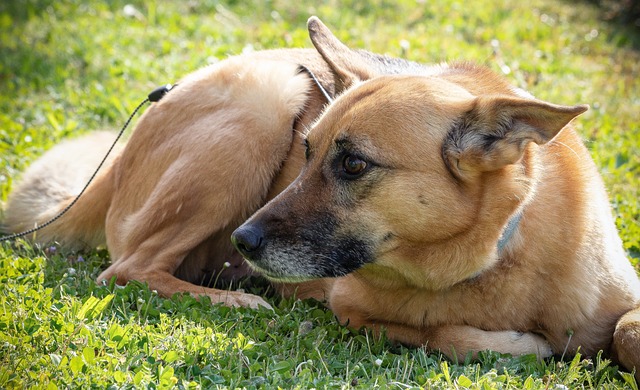


The Chinook is a rare and strong working dog known for its loyalty, intelligence, and calm demeanor. Developed in the United States, it was initially bred as a sled dog for long-distance racing and as a versatile working dog. With a medium to large build, the Chinook is known for its endurance, making it excellent for various activities, including hiking, sledding, and even as a family companion. Despite being a working dog, Chinooks are gentle, affectionate, and good with families, including children and other pets. Their friendly nature, combined with their energy and intelligence, makes them an outstanding all-around companion.
The Chinook breed was created in the early 20th century by a man named Arthur Walden in New Hampshire. Walden, who was an avid sled dog racer, sought to develop a breed that could handle the demands of long-distance sled racing. He crossed a Mastiff-type dog with a Husky and other sled dog breeds, with the goal of producing a dog that had strength, endurance, and a good temperament. The Chinook was used primarily for sledding, but its gentle disposition made it also suitable as a family companion. Over time, the breed nearly became extinct, but through dedicated efforts by breeders, the Chinook was revived in the late 20th century. The American Kennel Club (AKC) officially recognized the Chinook as a breed in 2013.
The Chinook is a medium to large-sized dog with a strong, muscular build. Males typically weigh between 55 and 90 pounds, while females are slightly smaller, usually weighing between 45 and 70 pounds. They stand around 21 to 27 inches tall at the shoulder. Chinooks have a thick double coat that is usually tan or reddish-brown with a black mask around their eyes, giving them an expressive look. Their coat is weather-resistant, designed to handle cold temperatures, which is important as they were originally bred to work in harsh winter conditions. They have a long, slightly curved tail and erect, triangular ears that add to their alert appearance. Chinooks are known for their strong, powerful build, which is balanced with an agile and athletic physique.
The Chinook is known for its gentle, friendly, and calm temperament. It is highly affectionate and tends to form strong bonds with its family members, making it an excellent companion. Chinooks are good with children and generally friendly with other pets, including dogs and cats, provided they are properly socialized from an early age. Although they have an independent streak, they are not aggressive and are typically very patient and tolerant. They are intelligent and eager to please, making them highly trainable. Their calm demeanor and friendly nature make them a great choice for families or individuals looking for a well-behaved and loyal companion.
The Chinook is an energetic and active breed that requires regular exercise to stay healthy and happy. Originally bred as a sled dog, they have great stamina and endurance, and they enjoy outdoor activities such as hiking, running, and playing in a yard. Daily exercise is important for keeping the Chinook physically and mentally stimulated. Without sufficient activity, they can become bored and may develop undesirable behaviors. Chinooks enjoy engaging in activities like agility training, pulling carts, and participating in dog sports, which allow them to use both their energy and intelligence. A well-exercised Chinook is a happy and content dog, so it is crucial to provide regular opportunities for physical and mental stimulation.
Chinooks are intelligent, eager to please, and highly trainable. Their calm and gentle nature makes them responsive to positive reinforcement training methods, including praise, treats, and play. Early socialization is crucial for Chinooks to ensure they grow up to be well-adjusted adults. Exposing them to various people, animals, and environments at a young age will help them develop good social skills and prevent shyness or wariness towards new experiences. Chinooks are generally easy to train, but they do have an independent streak, so consistency and patience are key when teaching them new commands. This breed thrives on having a job to do and enjoys working alongside their owners, making them excellent participants in dog sports or other activities that engage both mind and body.
The Chinook is generally a healthy breed, but like all dogs, they can be prone to certain health issues. Some common health concerns include hip dysplasia, hypothyroidism, and eye conditions such as cataracts. Regular veterinary check-ups, a healthy diet, and regular exercise are important for maintaining the overall health of a Chinook. Their thick coat requires regular grooming to keep it clean and healthy, though it is relatively low-maintenance. A weekly brushing is usually sufficient to remove loose hair and prevent matting. Chinooks are prone to shedding, especially during seasonal changes, so more frequent grooming may be needed during shedding periods. It’s also important to check their ears for signs of infection and to maintain good oral hygiene by regularly brushing their teeth.
The average lifespan of a Chinook is around 12 to 15 years. With proper care, including regular exercise, a balanced diet, and routine veterinary visits, many Chinooks can live long and healthy lives. As with all breeds, genetics plays a role in lifespan, so it’s important to ensure that your Chinook receives the proper care throughout its life to maximize its longevity.
© copyright Dog Compendium 2024 - 2026